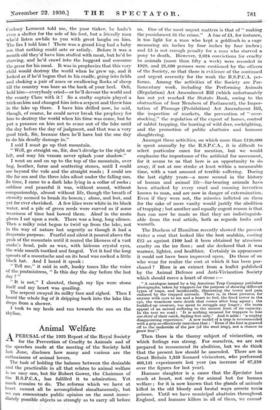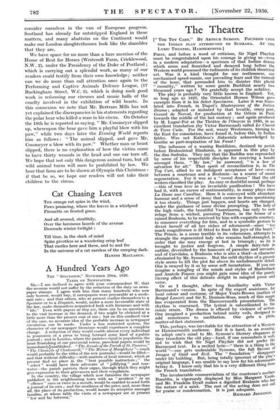Animal Welfare
A PERUSAL of the 1929 Report of the Royal Society for the Prevention of Cruelty to Animals and of the speeches made at the meeting of the Society held last June, discloses how many and various are the enthusiasms of animal lovers.
The task of holding the balance between the desirable and the practicable in all that relates to animal welfare is no easy one, but Sir Robert Gower, the Chairman of the R.S.P.C.A., has fulfilled it to admiration. Yet much remains to do. The reforms which we have at heart cannot all be accomplished simultaneously, but we can concentrate public opinion on the most imme- diately possible objects so strongly as to carry all before
us. One of the most urgent matters is that of " making the punishment fit the crime." A fine of £1, for instance, is too light for a man who kept a goldfinch in a cage measuring six inches by four inches by four inches ; and £5 is not enough penalty for a man who starved a pony to death. However, 2,624 convictions for cruelty to animals (more than fifty a week) were recorded in 1929, and 21,680 persons were cautioned by the officers of the Society, so that there is evidence of the continued and urgent necessity for the work the R.S.P.C.A. per- forms. Among the activities of the Society are Par- liamentary work, including the Performing Animals (Regulation) Act Amendment Bill (which unfortunately has not yet reached the Statute Book, owing to the obstruction of four Members of Parliament), the Impor- tation of Plumage (Prohibition) Act Amendment Bill, the inspection of markets, the prevention of " over- stocking," the regulation of the export of horses, control of rabbit trapping, the hunting of wild deer, cockfighting, and the promotion of public abattoirs and humane slaughtering.
Amongst these activities, on which more than £120,000 is spent annually by the R.S.P.C.A., it is difficult to select particular cases for mention, but we would emphasize the importance of the artificial fur movement, for it seems to us that here is an opportunity to do away, if not at one stroke at least within a measurable time, with a vast amount of terrible suffering. During the last eighty years—a mere second in the history of human and animal life—fur-bearing animals have been attacked by every cruel and cunning invention known to man, and are now in danger of extermination. Even if they were not, the miseries inflicted on them for the sake of mere vanity would justify the abolition of trapping ; but another and equally cogent reason is that furs can now be made so that they are indistinguish- able from the real article, both as regards looks and warmth.
The Duchess of Hamilton recently showed the present writer a coat that looked like the best sealskin, costing £25 as against £100 had it been obtained by atrocious cruelty on the ice floes ; and she declared that it was warmer, lighter, and healthier. Certainly in appearance it could not have been improved upon. Do those of us who wear fur realize the cost at which it has been pur- chased ? Here is an extract from a leaflet published by the Animal Defence and Anti-Vivisection Society which should move a heart of stone :— " A catalogue issued by a big American Trap Company publishes photographs, taken by trappers for the purpose of showing different types of traps, and incidentally, illustrating the terror and pain endured by the trapped animals There us, in these pictures, for anyone with eyes to see and a heart to feel, the fixed terror in the eye, the weariness unto death that comes after long agony ; the huddled-up creature, too spent to struggle any longer; the mute appeal of an animal suffering to the utmost limit of its capacity. In the text we read : ' It is nothing unusual for trappers to lose one-third of their catch, finding feet only.' And it adds : ' a mighty disappointing experience.' A new model of a trap is recommended with a grip so effectively merciless that : ' Even if the foot is gnawed off to the underside of the jaw (of the steel trap), not a chance to
gnaw free'."
Then there is the thorny subject of vivisection, on which feelings run strong. For ourselves, we are not prepared to recommend its abolition, but we do think that the present law should be amended. There are in Great Britain 1,353 licensed vivisectors, who performed 403,141 experiments last year (an increase of 87,250 over the figures for last year).
Humane slaughter is a cause that the Spectator has much at heart, not only for animal but for human welfare ; for it is now known that the glands of animals killed in the old bloody and brutal ways secrete toxin poisons. Until we have municipal abattoirs throughout England, and humane killers in all of them, we calm!, consider ourselves in the van of European progress. Scotland has already far outstripped England in these matters, and many abattoirs on the Continent would make our London slaughterhouses look like the shambles that they are.
We have space for no more than a bare mention of the Home of Rest for Horses (Westeroft Farm, Cricklewood, N.W . 2), under the Presidency of the Duke of. Portland ; which is carrying out a splendid work, as many of our readers could testify from their own knowledge; neither can we do more than call attention once again to the Performing and Captive Animals Defence League, (17 Buckingham Street, W.C. 2), which is doing such good work in reforming our circuses and music halls of the cruelty involved in the exhibition of wild beasts. In this connexion we note that Mr. Bertram Mills has not yet explained the discrepancies in his statements regarding the polar bear who killed a man in his circus. On October the 18th he is reported as saying, " Mr. Cossmeyer slipped up, whereupon the bear gave him a playful blow with his paw," while two days later the Evening World reports him as follows : " The animal slipped, and gave Mr. Cossmeyer a blow with its paw." Whether man or beast slipped, there is no explanation of how the victim came to have thirty wounds in the head and one ear torn off. We hope that not only this dangerous animal turn, but all wild animal turns will soon be prohibited by law. We hear that lions are to be shown at Olympia this Christmas : if that be so, we hope our readers will not take their children to the circus.



















































































 Previous page
Previous page